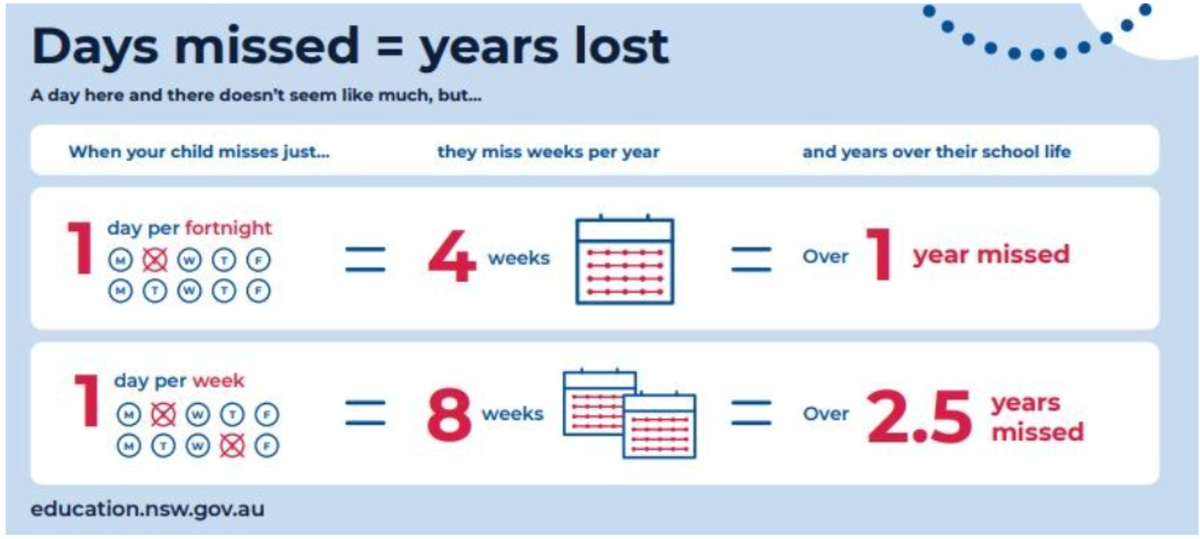Student Wellbeing

Attendance Matters
TOP ATTENDANCE TIPS FOR PARENTS
- Schools want to work in partnership with parents – act early if you have any concerns by contacting the College and asking for advice and support. Seek help from your school if you are concerned about your child’s attendance and wellbeing. Schools want to work in partnership with parents to support student attendance and wellbeing. Your child’s Leader of Student Care (LOSC) is your first step. Contact : 67610800 or mccadmin@arm.catholic.edu.au to arrange a meeting or phone call back.
- Remember that every school day counts
- There is no safe number of days for missing school – each day a student misses puts them behind, and can affect their educational outcomes and their social connectedness
- Talk positively about school and the importance of attending every day
- Open and prompt communication with your child’s school about all absences is a good idea: mccadmin@arm.catholic.edu.au, or respond to Compass notifications ASAP.
- Avoid making routine medical and dental appointments during the school day or planning family holidays during the term
We appreciate your support in ensuring that your child/children are at school on time each day, ready to learn.
Attendance isn't just about being physically present; it's about actively participating in the educational journey, seizing every chance to grow, learn, and thrive.
In Australia, the correlation between regular school attendance and academic success is well-established. According to the Australian Bureau of Statistics (ABS), students who attend school regularly are more likely to achieve higher academic outcomes and develop essential skills for future success. Moreover, consistent attendance fosters a sense of belonging and engagement within the school community, leading to improved social and emotional well-being.
One of the key tools we use to track attendance and ensure every absence is accounted for is the Compass App. By submitting attendance notes via Compass when a student is away, parents and guardians play a crucial role in helping us maintain accurate records and support students' educational progress. These notes contribute to explained absences (rather than unexplained absences), helping us understand the reasons behind missed days and provide appropriate support where needed.
Why Every Day Counts:
Every day in school is a building block for future achievements. Here are some reasons why consistent attendance matters:
- Academic Progress: Regular attendance allows students to stay on track with their lessons, participate in class discussions, and benefit from teacher guidance, leading to improved academic performance.
- Social and Emotional Development: School is not just about academics; it's also a place where students develop social skills, build friendships, and learn valuable life lessons through interactions with peers and teachers.
- Access to Support Services: Consistent attendance ensures that students have access to support services such as our college psychologists, Leaders of Student Care, and extracurricular activities, enhancing their overall well-being and development.
Partners in Progress:
We recognise that maintaining regular attendance is a shared responsibility between the school, parents, and students. By working together and prioritising attendance, we can create an environment where every student has the opportunity to reach their full potential and achieve academic success.
As we embark on this term's educational journey, let's remember that every day counts. Please use the Compass App system to keep track of attendance and ensure that every absence is accounted for and supported.
Thank you for your ongoing support in fostering a culture of attendance and commitment to learning.
Warm regards,
Melissa Lees
STUDENT ABSENCES
The main reasons for absence are:
Sickness - There are always times when students need to miss school, such as when they're ill. It's vital that they're only away on the days they are genuinely sick, particularly during Winter. Developing good sleep patterns, eating well and exercising regularly can make a big difference.
Family holidays - It's vital that holidays are planned during school holidays where possible, and not during the term. If you are planning to go on holiday during term time, make sure parents contact the school administration team in advance to gain approved leave. Students and / or parents are to inform their Leader of Student Care once approval for leave has been made. Students where possible, are advised to access Google Classroom for missed learning tasks. Students in Year 11 and 12 must follow NESA rules regarding assessment tasks, so students talking to their subject teacher about upcoming planned absences is essential.
"Day off" - Think twice before letting your child have a "day off" as they could fall behind their classmates - every day counts.
Truancy - This is when students choose not to go to school without their parent's permission. There can be many reasons for truancy. The best way to address this is for schools and parents to work together.
School Refusal - School refusing children will experience significant emotional distress not only when going to school but also at the thought of going to school; they may be absent from school for weeks or even months at a time. School refusal differs from truancy as children generally stay home with the knowledge of the parents and despite their best efforts to encourage their child to go to school. Please contact your child's Leader of Student Care if school refusal is an ongoing concern. When schools work in partnership with families, barriers can be reduced and support put in place to improve attendance. One tool to support improved connection to school is an Attendance Improvement Plan which is a co-designed strategy involving parents, student and the Leader of Student Care.
At McCarthy, our day of learning starts promptly at 8:45 am each day with Mentor Group for 20 minutes. This is a time to "get ready" for the upcoming day and helps ease students into learning for the day.
Arriving even a few minutes late can result in an unsettled start to the day for that student and disrupt the rest of the class. As the tables show from the NSW Department of Education, a few minutes each day can also add up to be quite a significant period of missed learning over a week, a term, a year and their school life!
Sharon Stuart
Leader of Student Wellbeing


